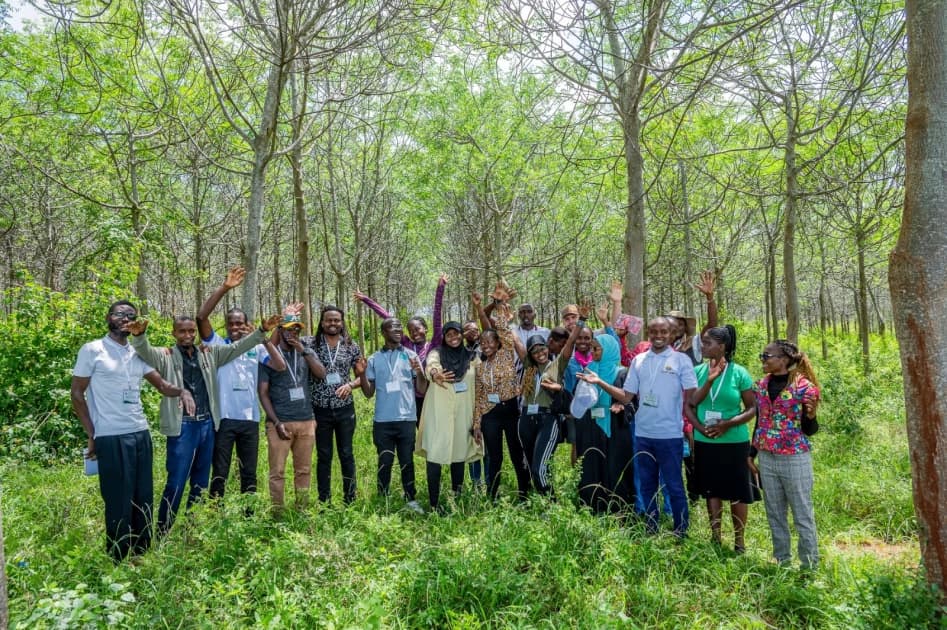We're loading the full news article for you. This includes the article content, images, author information, and related articles.
A new 'Wild Senses' campaign, backed by a renowned wildlife expert, is encouraging Kenyans to engage with the natural world, particularly during the cooler months, amidst concerns of a growing disconnect.

As the cooler seasons approach, a conservation initiative is calling on Kenyans to immerse themselves in the sights, sounds, and smells of nature. The "Wild Senses" campaign, spearheaded by an unnamed conservation charity and supported by British wildlife expert and camera operator Hamza Yassin, aims to foster a deeper connection between people and the natural environment. The campaign's launch follows a poll indicating a notable disconnect with nature during the darker months.
Hamza Yassin, known for his work on BBC series such as "Hamza's Hidden Wild Isles," "Countryfile," and "Animal Park," advocates for utilising all senses to appreciate wildlife throughout the year. His involvement seeks to inspire Kenyans to recognise and value the diverse ecosystems surrounding them.
Kenya boasts rich biodiversity and is a global leader in wildlife conservation efforts, with iconic national parks like Maasai Mara and Amboseli serving as vital habitats for numerous species. Approximately 8% of Kenya's land is designated for wildlife conservation, complemented by around 160 conservancies covering 6.36 million hectares, or 11% of the nation's landmass. These conservancies play a crucial role, particularly in protecting species such as the Grevy's zebra, with 90% of the global population found within them, and black rhinos, with 45% residing in private and community conservancies.
Despite these efforts, Kenya faces ongoing challenges including habitat loss, deforestation, and human-wildlife conflict. Various organisations, including Nature Kenya, Kenya Wildlife Trust (KWT), Zoological Society of London (ZSL), The Nature Conservancy (TNC), The Sheldrick Wildlife Trust, and the African Wildlife Foundation (AWF), are actively involved in addressing these issues through community engagement, anti-poaching initiatives, and habitat restoration.
Kenya's commitment to conservation is enshrined in its policies, with a strong emphasis on community participation in environmental management. The Environmental Management and Coordination Act (EMCA) of 1999 established the National Environment Trust Fund (NETFUND) to mobilise resources for environmental initiatives. Furthermore, the Kenyan Constitution (2010) promotes participatory governance, requiring public involvement in policy formulation at both national and county levels. However, effective implementation at the local level can be challenging due to governance complexities and coordination constraints.
Conservation organisations in Kenya consistently highlight the importance of community-led initiatives. For instance, the Kenya Wildlife Trust (KWT) focuses on empowering local communities and stakeholders in the Greater Mara, Samburu-Laikipia, and Amboseli-Tsavo ecosystems to protect vulnerable predator populations. The African Wildlife Foundation (AWF) also supports community conservancies and trains farmers in sustainable practices to mitigate human-wildlife conflict. These efforts demonstrate that tangible benefits, such as improved livelihoods, drive community engagement in conservation.
A disconnect between people and nature can have significant implications for conservation efforts and public well-being. Reduced awareness and appreciation for the environment may lead to decreased support for conservation policies and initiatives. Urbanisation in Kenya has also led to environmental degradation, with a lack of proper planning for green spaces contributing to air pollution. Campaigns like "Wild Senses" are crucial in bridging this gap, promoting environmental stewardship, and encouraging sustainable practices.
While the campaign aims to increase engagement, specific details regarding the conservation charity leading the "Wild Senses" campaign in Kenya remain unknown. The exact mechanisms through which this campaign will be localised and implemented across diverse Kenyan communities are also yet to be fully clarified. Furthermore, the long-term impact of such awareness campaigns on policy execution and sustained behavioural change requires ongoing monitoring and evaluation.
Moving forward, it will be important to observe how the "Wild Senses" campaign integrates with existing Kenyan conservation frameworks and community-led initiatives. The success of this campaign will likely depend on its ability to resonate with local contexts and provide accessible opportunities for Kenyans to connect with their natural heritage. Future reporting will focus on the specific activities undertaken, the public's response, and any measurable shifts in environmental awareness and engagement across the country.
Keep the conversation in one place—threads here stay linked to the story and in the forums.
Sign in to start a discussion
Start a conversation about this story and keep it linked here.
Other hot threads
E-sports and Gaming Community in Kenya
Active 9 months ago
The Role of Technology in Modern Agriculture (AgriTech)
Active 9 months ago
Popular Recreational Activities Across Counties
Active 9 months ago
Investing in Youth Sports Development Programs
Active 9 months ago